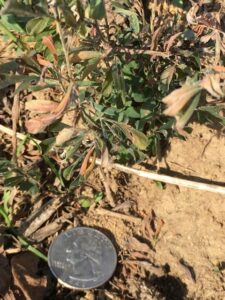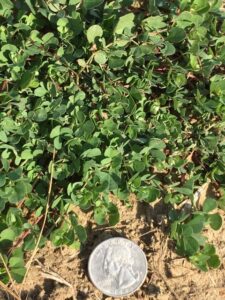2016 Annual Report for ONE14-203
High-tannin pasture plantings
Summary
Plants high in condensed tannins have been shown in numerous studies to help reduce the population of Haemonchus Contortus. This parasite can be a serious threat to small ruminant animals. These plants have been grown and used in the Southern United States for many years, but very little in the Northeast. This project will evaluate the ability to grow Sericea lespezda and Big Trefoil Lotus uliginosus, also known as L. pedunculatus in the Northeast. We will evaluate the plantings to see if they will survive Maine winters and be able to be grown as a perennial in pasture or whether they die and could only be used as an annual crop.
Objectives/Performance Targets
This project will evaluate biomass production with .25 meter sq. plot sample harvesting. Dry Matter levels will determined by drying the samples in the microwave. Using randomized complete block design, we will plant 10’x10’ plots of each species alone and each in combination with perennial rye. These plantings will be done at MOFGA’s Common Ground Education center. At the cooperating farms, 1/2 acre strips of trefoil and lespedeza will be tilled and broadcast seeded at the 4 lb./acre and 25lbs./acre rate. The farms will graze the strips for 1-3 days depending on the plant population. These grazing will be on the same schedule as the manual harvests.
Accomplishments/Milestones
On the MOFGA Common Ground Fair site the plots described above were planted.
6/20 planted Lespedeza and Trefoil with rye into 10x10plots.
On Noon Family Sheep Farm, Springvale, Maine 10×10 plots were planted with the remaining seed on 8/1, approximately and ounce each. Jean also did some test pots (picture included) to test the seed.
Impacts and Contributions/Outcomes
The large trefoil survived well another year at Beldings farm. It was tilled-in this spring because of the weed pressure and needing the field for other production. The planting and Hamilton farm were very sparce. But considering the weed pressure it was not surprising. This area was also tilled-in. The 2015 planting at MOFGA were tilled-in spring 2016 and another planting was attempted. Because of the drought, no lespedeza germinated and only a few clumps of trefoil. Photos are included. The planting at MOFGA were exhibited at the Common Ground Country Fair with a sign describing the project. Jean Noon, Noon Family Farm took the last of the left over seed and planted it on the farm in Springvale ME, this spring. Pictures of the plantings are included. We look forward to seeing the results of this years planting at the Noon Family Farm that was fairly well established in 2016.
Collaborators:
Farmer
250 Walker Mills Rd.
Harrison, ME 04040
Office Phone: 2075836047
Website: littlefallsfarm.com


